BOISE, Idaho — Doctors at St. Luke's Health System are pleading with people to stay away from the emergency room unless they are actually sick.
As coronavirus cases continue to spike across the state, more and more people have been coming to the ER for COVID-19 tests, even when they have no symptoms or very mild symptoms. This practice is unnecessarily adding to the workload of medical personal and stretching hospitals' resources even thinner, health officials say.
"Due to the rise in moderate to severe COVID-19 patients requiring hospitalization, it is critical to protect the valuable and limited resources in Emergency Departments," St. Luke's officials wrote in a release.
RELATED: Some Idaho hospitals 'reaching crisis stage' as coronavirus cases surge, medical experts warn
The emergency department should be reserved for those patients who are experiencing severe symptoms or have an urgent medical issue.
COVID-19 tests are available by appointment at select primary care clinics, most of which have same-day testing and results that are back within one to two days. People who come into the ER with no symptoms or mild symptoms will not get a coronavirus test, with the exception of patients who are going into surgery.
Due to limited supplies, the hospital is also not able to provide COVID-19 tests for pre-employment, return to work, or travel purposes.
Those with mild symptoms should quarantine at home and use St. Luke's self-triage tool to determine whether they need to be tested at a clinic.
Those who are not experiencing shortness of breath, but believe they are getting sicker should seek medical help if they are concerned, especially if they have a combination of symptoms including fever with muscle aches and fatigue, reduced sense of taste and smell, severe diarrhea and other stomach problems or a dry, persistent cough that is worsening.
Those with severe symptoms of COVID-19 should seek immediate medical help. Those who are ill are advised to check for the following symptoms when determining whether they need to go to the ER.
• Shortness of breath while at rest
• A dry cough, fever and it is getting more difficult to breathe
• Significant or worrisome cough that is increasing
• Confusion or sudden change in mental status
• Chest pain
• Low oxygen levels
• Extreme sleepiness or inability to wake
• Blue face or lips
Likewise, anyone with a serious medical issue not related to the coronavirus - like a significant injury, heart attack or stroke - should not delay going to a hospital for treatment.
"Do not ignore your body's warning signs. Hospitals are safe places for care," St. Luke's officials wrote in a release. "Protective measures are in place to protect you from getting or spreading COVID-19 in the Emergency Department."
At KTVB, we’re focusing our news coverage on the facts and not the fear around the virus. To see our full coverage, visit our coronavirus section, here: www.ktvb.com/coronavirus.
Facts not fear: More on coronavirus
See our latest updates in our YouTube playlist:

